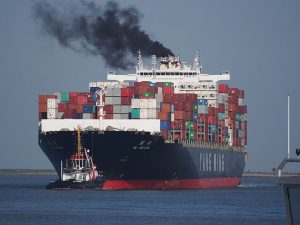World Fleet Does Not Seem Ready for IMO 2020
 We’re less than a month away from New Year’s Day when some big rule changes are to be implemented on the international shipping industry: Incoterms 2020 and IMO 2020 go into effect on January 1st. We talked about the changes from Incoterms 2010 with the Incoterms 2020 update in our previous blog post; today, we talk about IMO 2020.
We’re less than a month away from New Year’s Day when some big rule changes are to be implemented on the international shipping industry: Incoterms 2020 and IMO 2020 go into effect on January 1st. We talked about the changes from Incoterms 2010 with the Incoterms 2020 update in our previous blog post; today, we talk about IMO 2020.
By far, IMO 2020 is the scarier of the two new year implementations hitting international shipping. This is especially true as, with only a few weeks to go, the world fleet of cargo ships does not appear to be ready for the new rule.
In case you’re not a regular reader of Universal Cargo’s blog or don’t keep up with international shipping news in general, IMO 2020 refers to the International Maritime Organization’s (IMO) upcoming regulation change, requiring a 0.5% sulfur cap on ships’ fuel emissions, down from the current 3.5% limit. This is a big step in the effort to completely decarbonize ocean freight shipping. But are carriers and shipowners actually going to be able meet the new regulation once the ball drops for the new year or has the ball been dropped on this carbon reduction?
Strategy Concerns for IMO 2020
Part of the plan to meet IMO 2020 is obviously cleaner fuel. There are a number of concerns that go with cleaner fuel. It’s more expensive. Can enough be produced to support the world fleet? Has new, cleaner fuel been properly tested to make sure it does not put ships, cargo, and crew in danger? Perhaps these concerns are why carriers and shipowners turned even more heavily toward another strategy to meet IMO 2020.
That strategy is scrubbers, which are systems that act as onboard treatment plants to remove harmful gasses from ship engines and exhausts.
Scrubbers come with a couple concerns as well. Do scrubbers actually just replace air pollution with water pollution? Could scrubbers create dangers for ships, cargo, and crew? Despite these concerns, 3,000 ships have been scheduled to have scrubbers installed in them by 2020. However, just because ships are scheduled to have scrubbers installed by 2020 does not mean it’s successfully happening. And that’s a new concern that has popped up with Scrubbers…
Ships Stuck Waiting for Scrubbers
There is growing concern over the length of time it takes to get scrubbers installed in ships. The retrofitting, or at least the waiting for the retrofitting, is taking much longer than initially believed. Many ships are docked now, either having a fuel cleaning system installed or waiting to have one installed.
According to an article by Mike Wackett in the Loadstar, the ocean freight industry’s idle fleet has reached 225 ships, with over 60% of the capacity that’s represented by it being idle due to scrubber retrofitting. Cargo ships come in different sizes, so there’s not a direct ratio of capacity to number of ships to calculate exactly how many of those 225 ships are out for scrubber installation. But luckily, Wackett gives us those numbers too:
Based on consultant Alphaliner’s latest data, there are 83 ships, with a total capacity of 839,130 teu, either undergoing scrubber retrofits or at anchor awaiting their turn at shipyards.
Luckily, the months right after the new year are traditionally a slower time of year for international shipping. Carriers can get away with less capacity, and even need to have capacity discipline to keep downward pressure on freight rates from being unhealthy for them. However, 83 ships and over 839,000 TEU of capacity is quite a bit to have out of commission without a clear idea of when they’ll be available again.
There’s the rub. Shipyards can’t keep up with the demand for retrofitting ships with scrubbers. Wackett, in the Loadstar article, calls what’s happening with the retrofits a snarl-up:
Containership owners and ocean carriers are increasingly concerned at the time vessels are out of service for the installation of exhaust gas cleaning systems.
According to the latest assessment from shipbroker Clarksons, the average time required for a scrubber installation increased to 62 days in October, from 48 days in July. Indeed, one broker told The Loadstarrecently his owner had “written off” a ship for three months.
He explained: “The ship has joined a big queue at the yard in China, they don’t know when [the retrofit] will get started and then they have to ballast it back to Europe and phase it back into the trade. It’s a bit of a nightmare really.”
He added: “Apparently they promised the owner the scrubber could be done in five to six weeks, but it seems like that was a tad optimistic.”
Alphaliner said: “Owners are reporting significant delays at shipyards currently straining to cope with the large number of retrofit projects, due to limited access to trained labour and subcontractors.”
Final Thoughts
Wackett’s article, illuminating the delays and backups happening with scrubber installation on ships, is enough to make one wonder if enough ships will be retrofitted in time for the world fleet to be ready to go for IMO 2020.
Maybe there’ll be enough ships between those already fitted with scrubbers and those using cleaner fuel that the world fleet will be able to handle the lighter volume that comes at the beginning of the year. Perhaps a grace period will be created. Or maybe, we’ll see consequences like fines enforced on carriers and shipowners unable to comply with IMO 2020.
No matter which of the above outcomes we see, you can guarantee shipyards are rushing, even scrambling, to retrofit ships with scrubbers. And that might cause even bigger problems.
There’s reason to be concerned that things will start going wrong on ships within the next couple years because all these scrubbers are being installed under such a stressful rush. We’ve already seen dangerous situations created because of scrubber malfunction attributed to design flaws and shoddy workmanship from shipyards while installing the systems.
We’ll start seeing how this all plays out next month.





Very great article. Useful information in this article.Interesting information in this blog. Thanks for sharing.